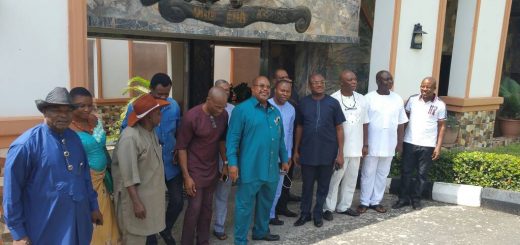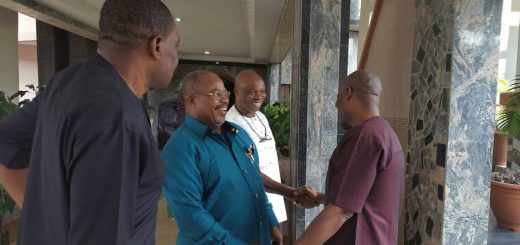Implications Of Dislocating Southeast From The Planned Coastal Rail Project – Chief Dr. David Ogba Onuoha Bourdex
Implications Of Dislocating Southeast From The Planned Coastal Rail Project.
By. Chief Dr. David Ogba Onuoha Bourdex MFR,OON
Signs that all was not well with President Muhammadu Buhari’s request for a $29.960bn loan from China Exim Bank emerged last year when the application went to the National Assembly.
The President had explained that the external loan, which without doubt was the biggest in Nigeria’s history, was for special projects ranging from infrastructure, agriculture, health, education, water supply among others.
On November 1, 2016 when the federal legislature rejected action on the application for authorization, the law makers hinged their decision on the fact that there was no borrowing plan accompanying the request.
Apart from the absence of a borrowing plan, the Senators discovered that there was no attached breakdown of the expenditure as claimed by the executive communication. However, to learn six months after that what was considered mere administrative oversight was actually a deliberate omission of certain sections of the country from an ambitious project such as rail development is worrisome.
Construction of standard gauge lines across the country deserves deep thinking and planning. The importance of rail transport cannot be overemphasized because during the colonial era, one of the very first steps taken by the white was rail line development. Railway transportation is the most cost effective way of moving goods, especially agricultural produce across the country.
It is therefore commendable that Federal Government should think along the line of improving Nigeria rail. But to exclude vital sections of the country, particularly Southeast and Northeast, is to stunt the economic and social benefits of the project. $5.8bn is not small amount money, as such to obtain that kind of funding by loan, which every part of the country would join in its repayment is not proper.
But the loan request specified that the standard gauge lines will run from Lagos-Kano, Kano-Kaduna, Lagos-Ibadan, and Lagos to Calabar. The original plan developed by Britain and the Royal Niger Company captured the Eastern region by linking the four zones of the South-South, South-East, North-Central and North-East and such very important industrial and commercial cities as Port-Harcourt, Aba, Enugu, Makurdi, Lafia, Gudi, Jos, Bauchi and Maiduguri.
It therefore beats every sane imagination why the design outlined by the Federal Government for the standard gauge should exclude most of these crucial cities. Major considerations in designing a railway master plan include level of economic activities, raw materials generation and opening up of hinterlands to link up major ports.
Developing a new railway master plan that excludes such important and commercial city as Aba does not make good economic sense. Senator Enyinna Abaribe was right in moving the Senate to reject approval for the loan until all regions were included in the utilization of the huge loan.
It was based on my belief that rail transportation holds the key to economic and national development that it formed part of my manifesto in 2015. I expressed determination to work with other senators to see how rich agrarian communities like Arochukwu are linked by rail to the national railway trunk.
This is the state we should have been aiming at instead of excluding well endowed cities like Aba. Evacuation of farm produce is done more efficiently through the railway because of its capacity. The huge sums of money put into road construction would have borne much fruit if it was backed with a well developed railway system.
The giant leap in economic development achieved through the introduction of Global satellite mobile telecommunication (GSM) system should have been followed up with massive connectivity of important cities in the six geopolitical zones in a railway matrix.
I believe that this is the time for the Federal Government to undertake construction of a ring railway across the country such that it would be possible to interconnect the six geopolitical zones. If that structure is developed with the China loan, with time it could be linked up to other cities.
Rail transportation is answer to incessant road failures due to pressure from articulated vehicles. The quantity of goods that 22 coaches of a train could lift in one trip will take more than 100 trailers to evacuate.
Another benefit of a well developed railway transportation system is that it helps in keeping the environment free of carbon emission in exhaust fumes from vehicles. Despite the large volume of consignments it takes, railway transportation does not witness the same rapidity of wear and tear as roads.
Efficient transport is therefore a critical component of economic development, globally and nationally. Transport availability affects global development patterns and can be a boost or a barrier to economic growth within individual nations. Transport investments lock factors of production together in a web of relationships between producers and consumers to create a more efficient division of production, leverage geographical comparative advantage, and provide the means to expand economies of of scale and scope. Transport’s contribution to economic development includes the following:
Network effects – linking more locations exponentially increases the value and effectiveness of transport. Performance improvements – reducing cost and time for existing passenger and freight movements increase transport’s contribution to economic growth. Reliability – improves time performance and reduces loss and damage, thus reducing economic drag. Market size – access to wider markets adds to economic of scale in production, distribution, and consumption, thereby increasing economic growth. Productivity – transport increases productivity gained from access to a larger and more diverse base of inputs such as raw materials, parts, energy, and labor, and broader markets for more diverse outputs
Transport has affected economic development from the beginning of hum civilization. Economic development focused on the confluence of transport systems – early cities grew up on natural bays and ports, and on rivers and lakes where transport was available. Romans built roads to unify and provide access to their far-flung empire.
Geographic characteristics such as proximity to oceans, seas and waterways, plain, mountains and the location of oases defined early transport systems.
The industrial revolution generated new transport demands, which required higher volumes of coal, iron ore, and other materials and this led to early railway development.
Given that rail transportation is therefore a veritable source of massive job creation as well as ancillary economic activities, the Southeast caucus in the National Assembly should ensure that they filibuster the loan request. The amount involved is equivalent to ten years provision in the current national budget.
We in Abia State cannot afford not have that rail line passing through our State.
We can only sustain the campaign to buy made in Aba goods if we have the transport means to sell those goods to the world. The Chines and other investors we expect to invest in Abia will be more willing to do so if they know they would have a cost effective means of evacuating their products both for export and for local consumption. The employment the rail line crossing Abia would generation would go a long way in helping solve our youth employment issues.
It is situations like this that challenges communities to ensure that forward looking and visionary persons such as Sen. Enyinnaya Abaribe are selected for the National Assembly, not those that see the legislature as a place to sleep and crack jokes over the meaning of words.
That the Arochukwu to Ohafia road has not received federal attention is partly because the issue has not been given the focal protest it deserves. Arochukwu has been generating farm produce, including cassava, yam and plantain, such that with a well developed transportation system that blends roads to rail, the area will serve as a new industrial hub. It was for this reason that we felt that area deserves even a light rail it to link the coastal rail.
Development of infrastructure is a task that has become overdue. But it must take into consideration areas of potentials and feasibility for expansion of trade and industry. Linking the commercial city of Aba, Port Harcourt and Lagos by rail would deliver an explosive economic prosperity that will in turn raise satellite cities along the coastline. The China Eximbank facility should not be treated with the characteristic way of sentimental consideration.
Chief Dr. David Ogba Onuoha Bourdex MFR,OON
“Ugoena” Nde Abiriba
Writes from Small London.







